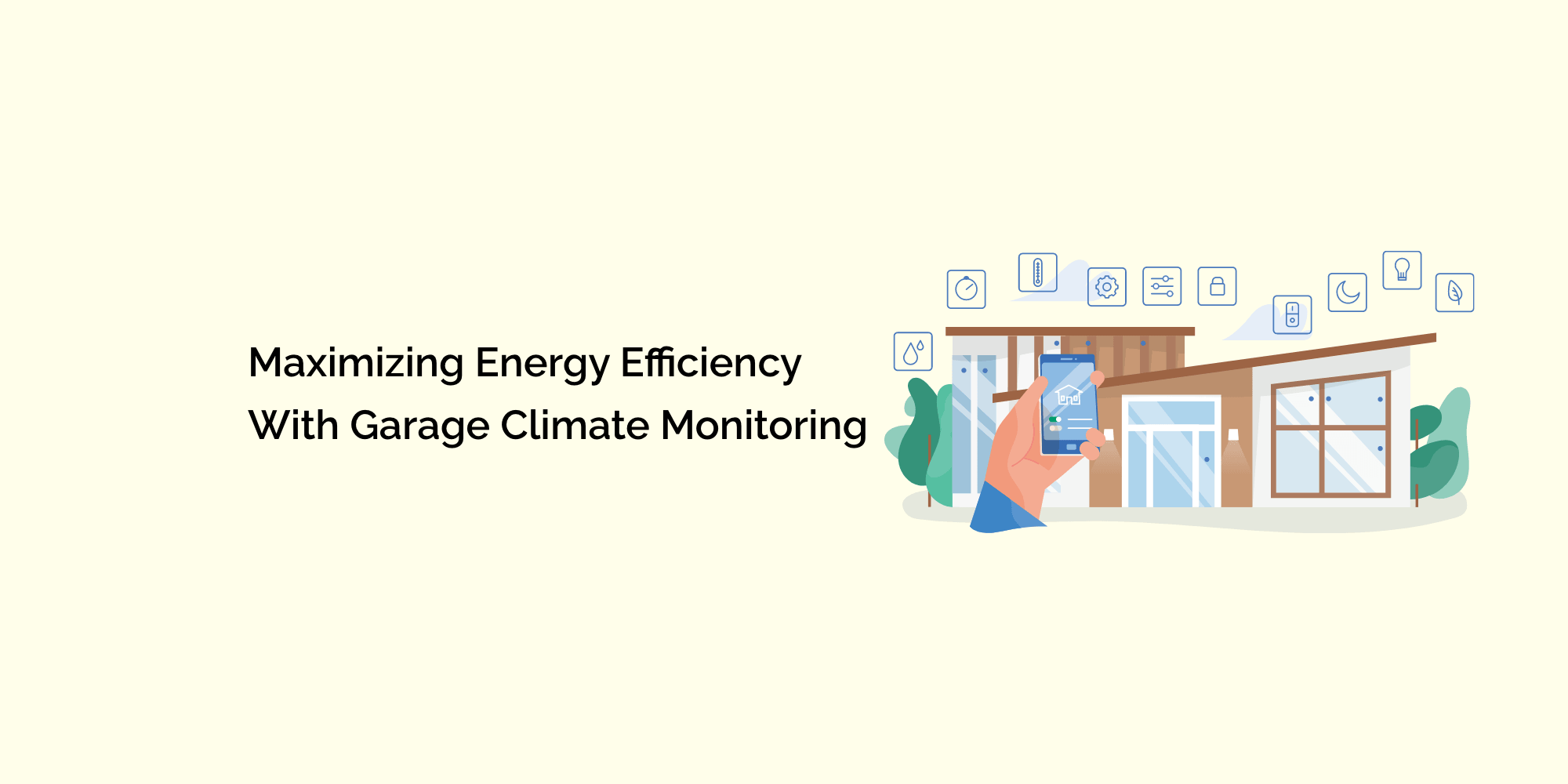Maximizing energy efficiency is a goal for many homeowners, and one area often overlooked is the garage. The garage is not only a space for parking vehicles but also serves as a storage area and sometimes a workshop. By implementing effective climate monitoring in your garage, you can optimize energy usage, reduce utility costs, and contribute to a more sustainable lifestyle.
In this blog, we will explore the importance of monitoring the climate in your garage, discuss the benefits of maximizing energy efficiency, and provide practical tips for achieving optimal results.
The Significance of Garage Climate Monitoring
Temperature and Humidity Impact:
Fluctuating temperature and humidity levels in your garage can affect the performance and lifespan of stored items, appliances, and even your vehicles. Monitoring these factors allows you to identify potential issues early on and take necessary steps to maintain a stable climate.
Energy Consumption Awareness:
By monitoring the climate in your garage, you gain insight into how different factors, such as insulation, ventilation, and equipment usage, impact energy consumption. This awareness empowers you to make informed decisions and implement energy-saving strategies.
Prevention of Damage and Loss:
Proper climate monitoring helps prevent damage and loss of valuable items stored in the garage. Excessive heat, cold, or humidity can lead to deterioration, mold growth, and rust formation. Timely intervention based on climate data can mitigate these risks.
II. Benefits of Maximizing Energy Efficiency in the Garage
Reduced Utility Bills:
Maximizing energy efficiency in your garage leads to lower utility bills. By monitoring the climate and implementing energy-saving measures, such as improved insulation, optimized ventilation, and efficient appliance usage, you can significantly reduce energy consumption.
Environmental Impact:
Energy-efficient practices in the garage contribute to a more sustainable lifestyle. By minimizing energy waste, you reduce greenhouse gas emissions and your carbon footprint, making a positive impact on the environment.
Extended Appliance Lifespan:
Energy-efficient practices, coupled with climate monitoring, help extend the lifespan of appliances and equipment in your garage. Stable temperature and humidity levels reduce the strain on motors, prevent premature wear and tear, and enhance overall performance.
Comfort and Usability:
An energy-efficient garage provides a more comfortable and usable space. Stable temperatures make it more pleasant to work or spend time in the garage, while proper ventilation ensures fresh air and eliminates stuffiness.
III. Practical Tips for Maximizing Energy Efficiency
Climate Monitoring Systems:
Invest in a reliable climate monitoring system for your garage. These systems typically consist of sensors that measure temperature, humidity, and sometimes air quality. Choose a system that provides real-time data and allows you to track historical trends.
Insulation and Sealing:
Improve insulation in your garage to minimize heat transfer and maintain stable temperatures. Insulate walls, ceiling, and garage door. Seal any gaps or cracks to prevent air leakage.
Efficient Lighting:
Replace traditional light bulbs with energy-efficient LED lighting. LEDs consume less energy, have a longer lifespan, and produce less heat, resulting in reduced cooling needs in the garage.
Smart Thermostats and Timers:
Consider installing a smart thermostat in your garage to regulate temperature based on usage patterns. Use programmable timers to automatically adjust the temperature during periods of inactivity or when the garage is not in use.
Ventilation Optimization:
Ensure proper ventilation in the garage to improve air circulation and prevent moisture buildup. Install vents or fans to remove stale air and introduce fresh air when needed.
Appliance Efficiency:
Use energy-efficient appliances and equipment in your garage. Look for appliances with Energy Star ratings, which indicate higher energy efficiency. Replace old, inefficient appliances with newer models that consume less power.
Power Management:
Practice efficient power management in your garage. Unplug electronic devices and appliances when not in use to eliminate phantom energy consumption. Use power strips with built-in switches to easily turn off multiple devices at once.
Timely Maintenance:
Regularly maintain appliances, HVAC systems, and other equipment in your garage. Clean or replace air filters to ensure optimal performance and energy efficiency. Keep mechanical components lubricated to reduce friction and energy loss.
Energy-Efficient Garage Doors:
Consider upgrading to an energy-efficient garage door. Look for doors with good insulation properties and weatherstripping to minimize heat transfer and air leakage.
Solar Power Integration:
Explore the possibility of integrating solar power into your garage. Installing solar panels can offset energy consumption and reduce reliance on the electrical grid.
Energy Monitoring and Analysis:
Use energy monitoring tools and apps to track your garage's energy consumption. Analyze the data to identify patterns, detect energy-wasting areas, and make informed decisions for further energy optimization.
Educate and Involve Family Members:
Educate your family members about energy-efficient practices in the garage. Encourage them to be mindful of energy consumption and involve them in implementing energy-saving strategies.
IV. The Role of Technology in Energy Efficiency
Smart Home Integration:
Integrate your garage's climate monitoring system with your smart home setup. This allows you to remotely monitor and control the garage's temperature and humidity levels, ensuring energy efficiency even when you're away.
Energy Management Apps:
Utilize energy management apps that provide real-time energy consumption data, offer energy-saving tips, and allow you to set energy usage goals. These apps can help you track progress and make adjustments for maximum efficiency.
Home Energy Audits:
Consider conducting a comprehensive home energy audit, including the garage. Professional auditors can assess energy usage, identify areas for improvement, and provide recommendations tailored to your specific needs.
Conclusion
Maximizing energy efficiency in your garage is not only beneficial for reducing utility bills but also contributes to a more sustainable lifestyle. By implementing climate monitoring, adopting energy-saving practices, and leveraging technology, you can achieve optimal energy efficiency and create a comfortable, functional, and environmentally friendly garage. With careful consideration and consistent efforts, you can make a significant impact in reducing energy consumption, lowering costs, and protecting the environment for a greener future.








